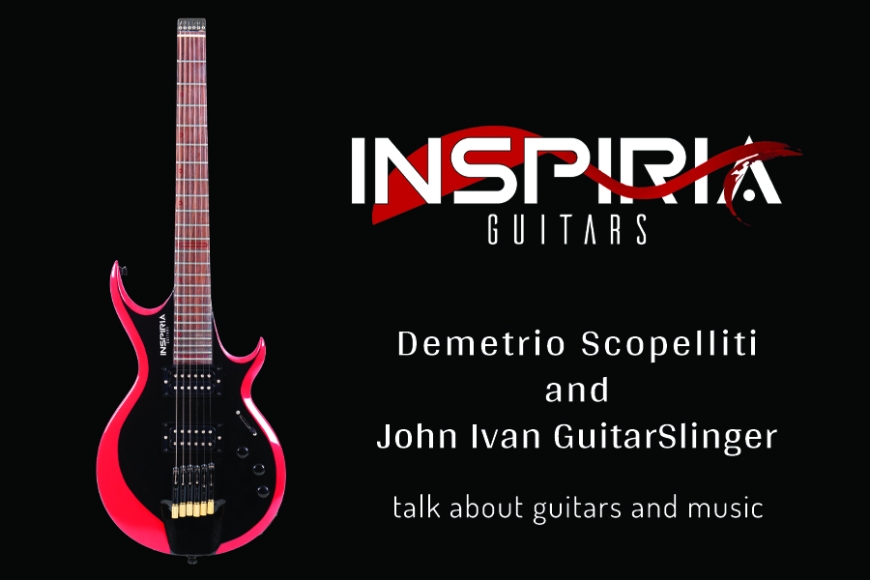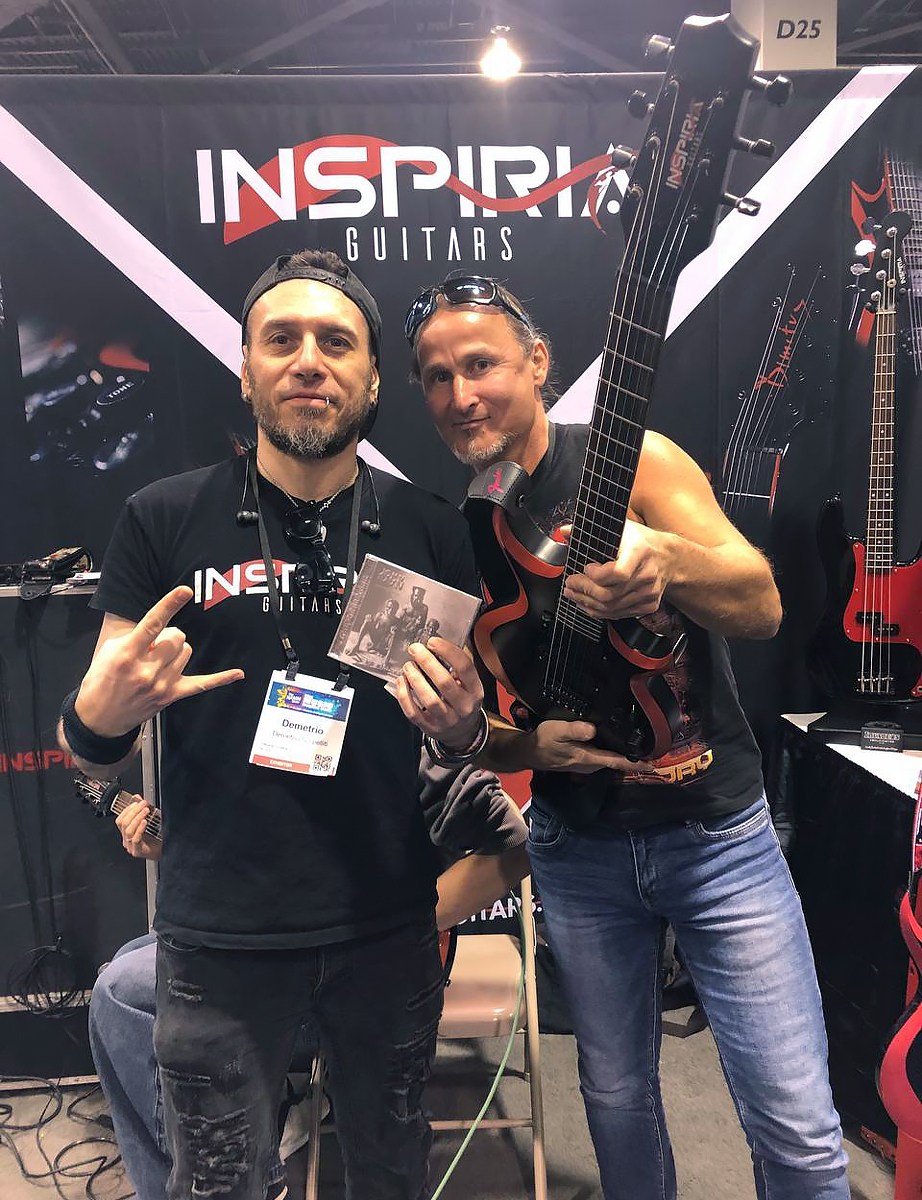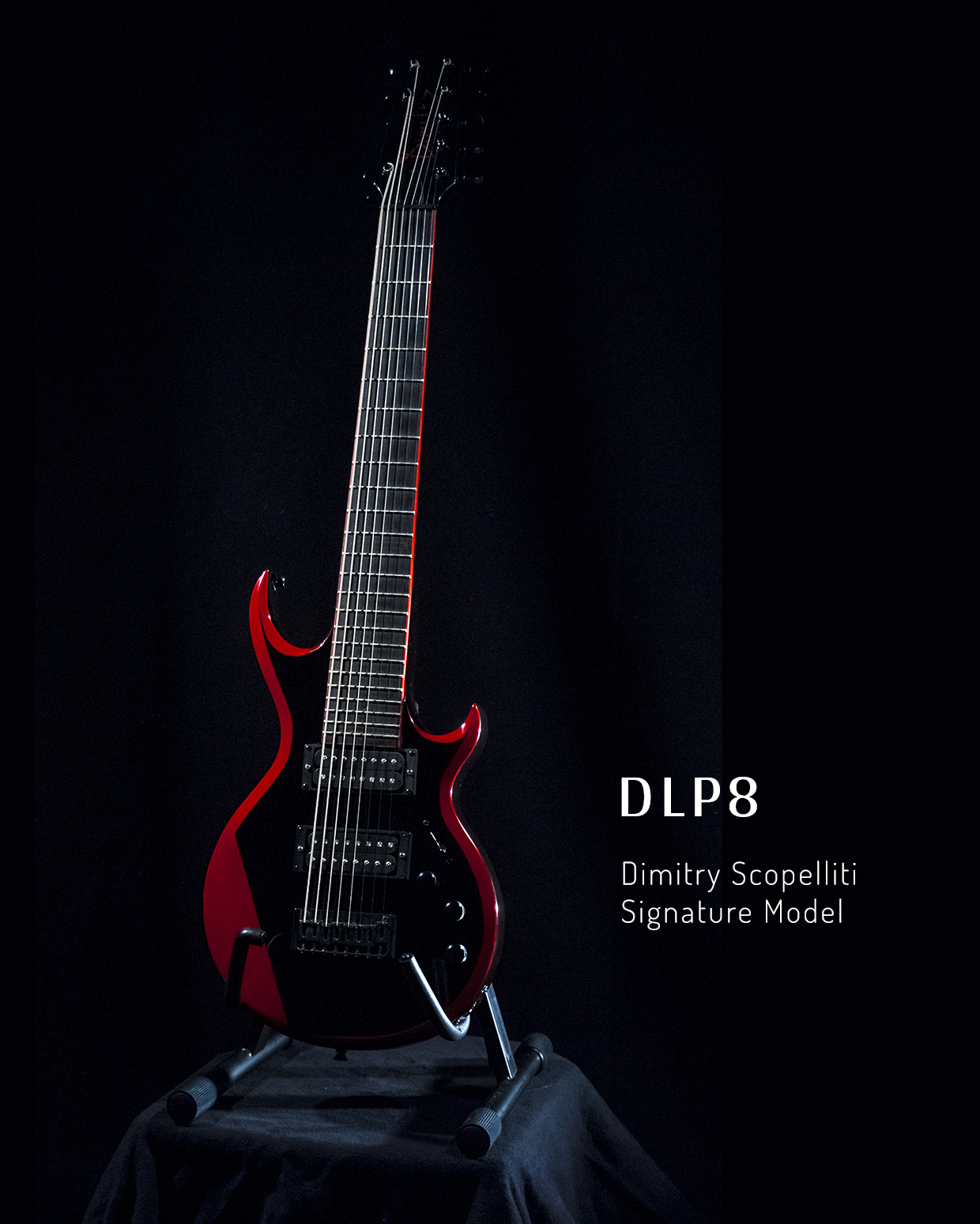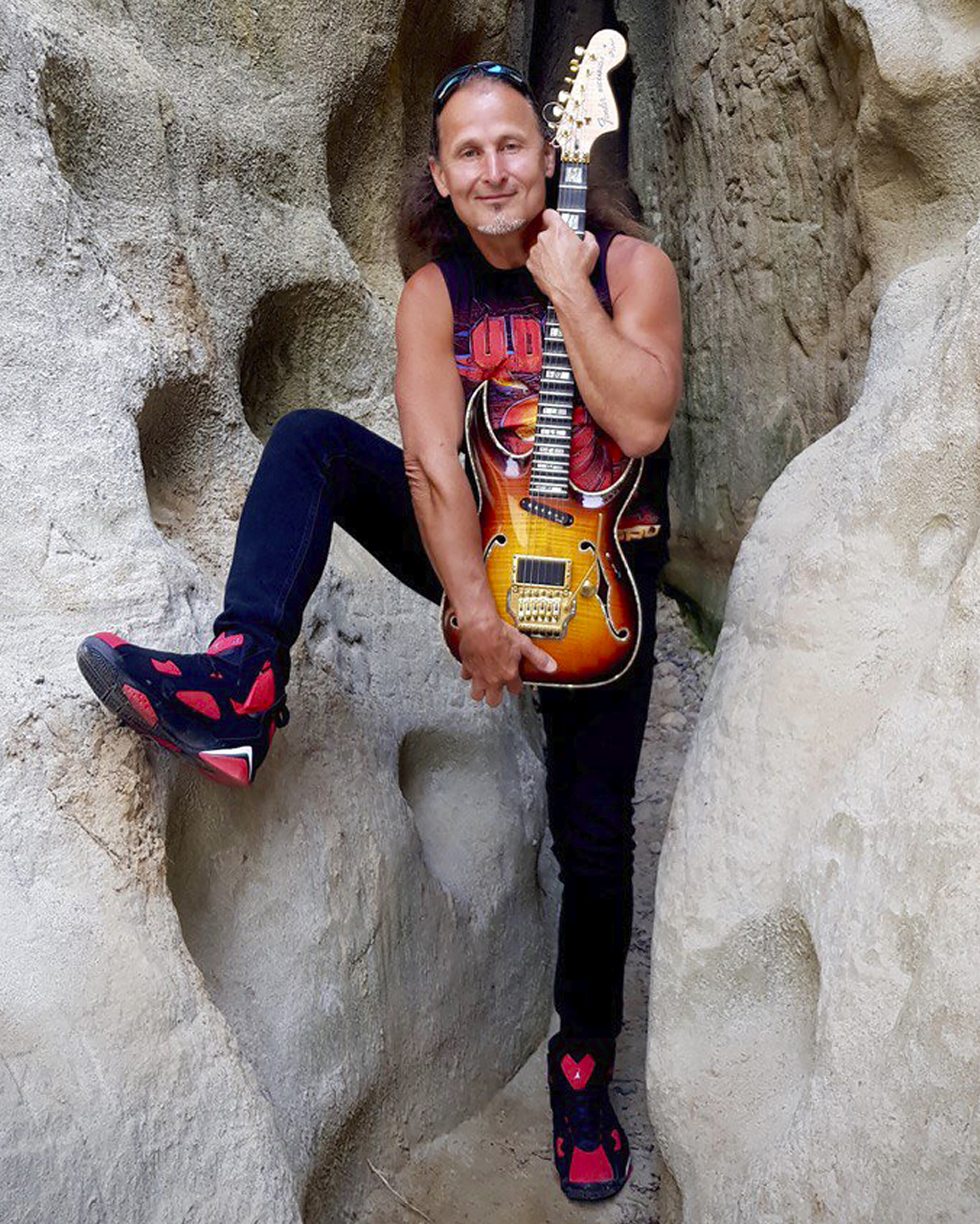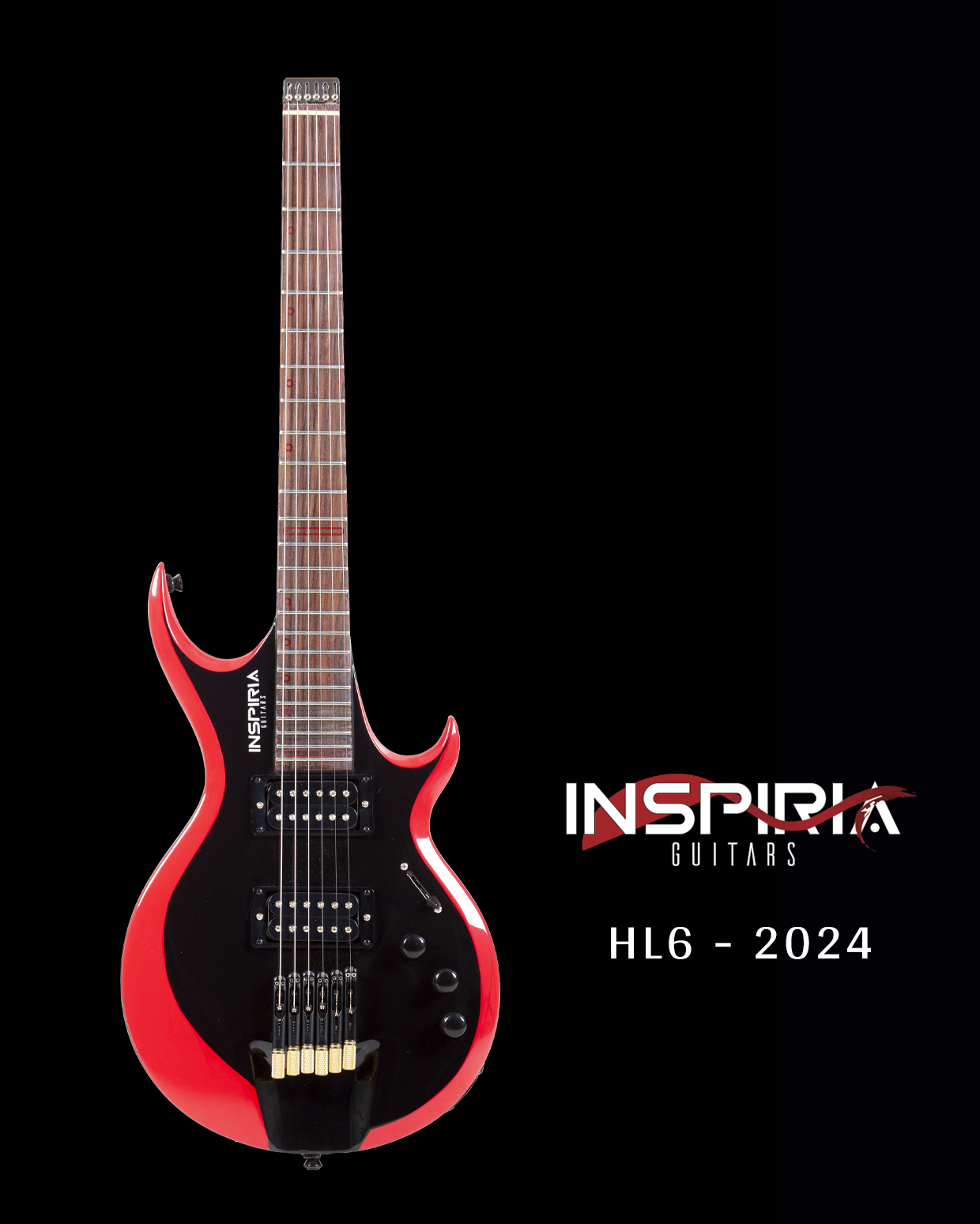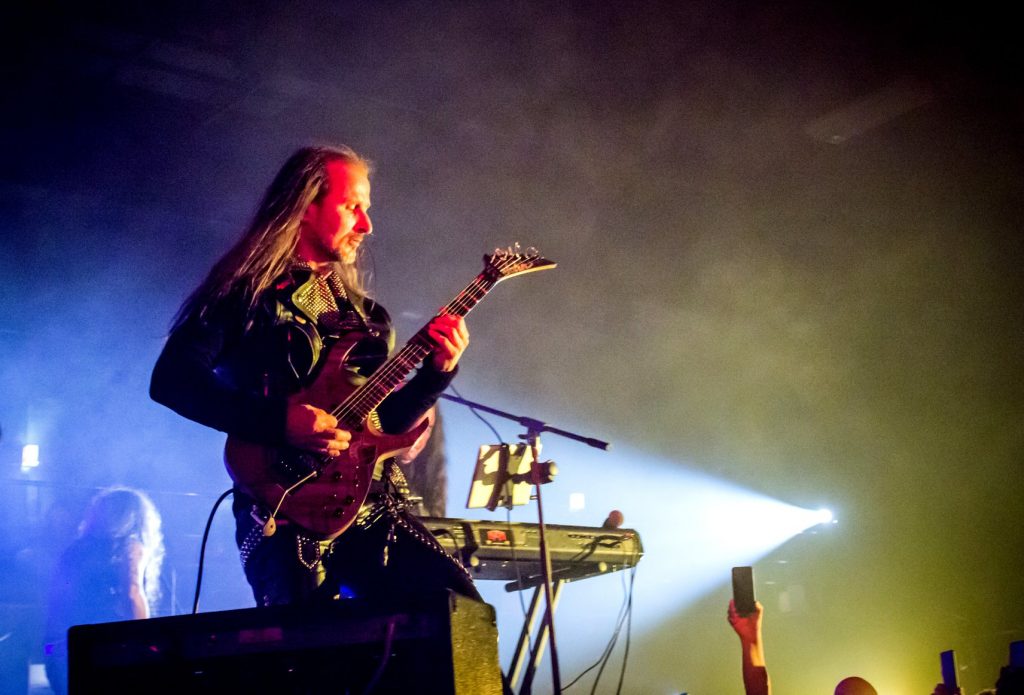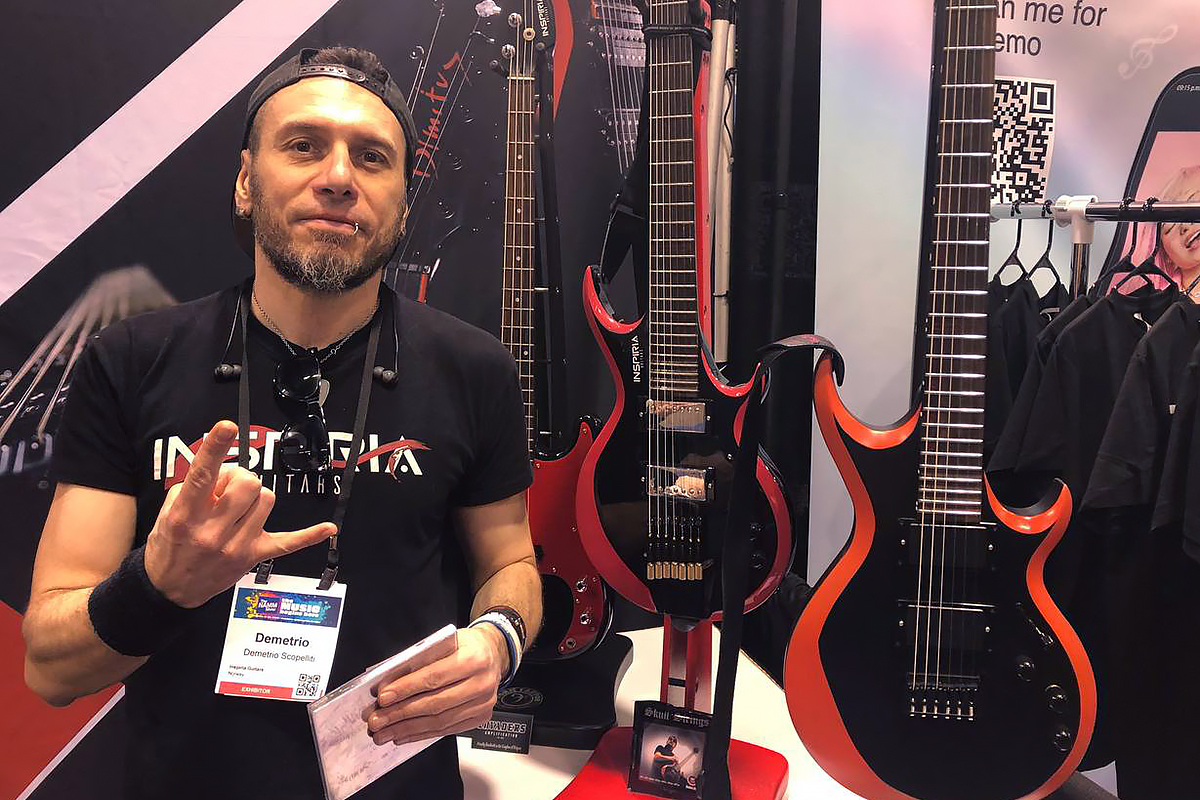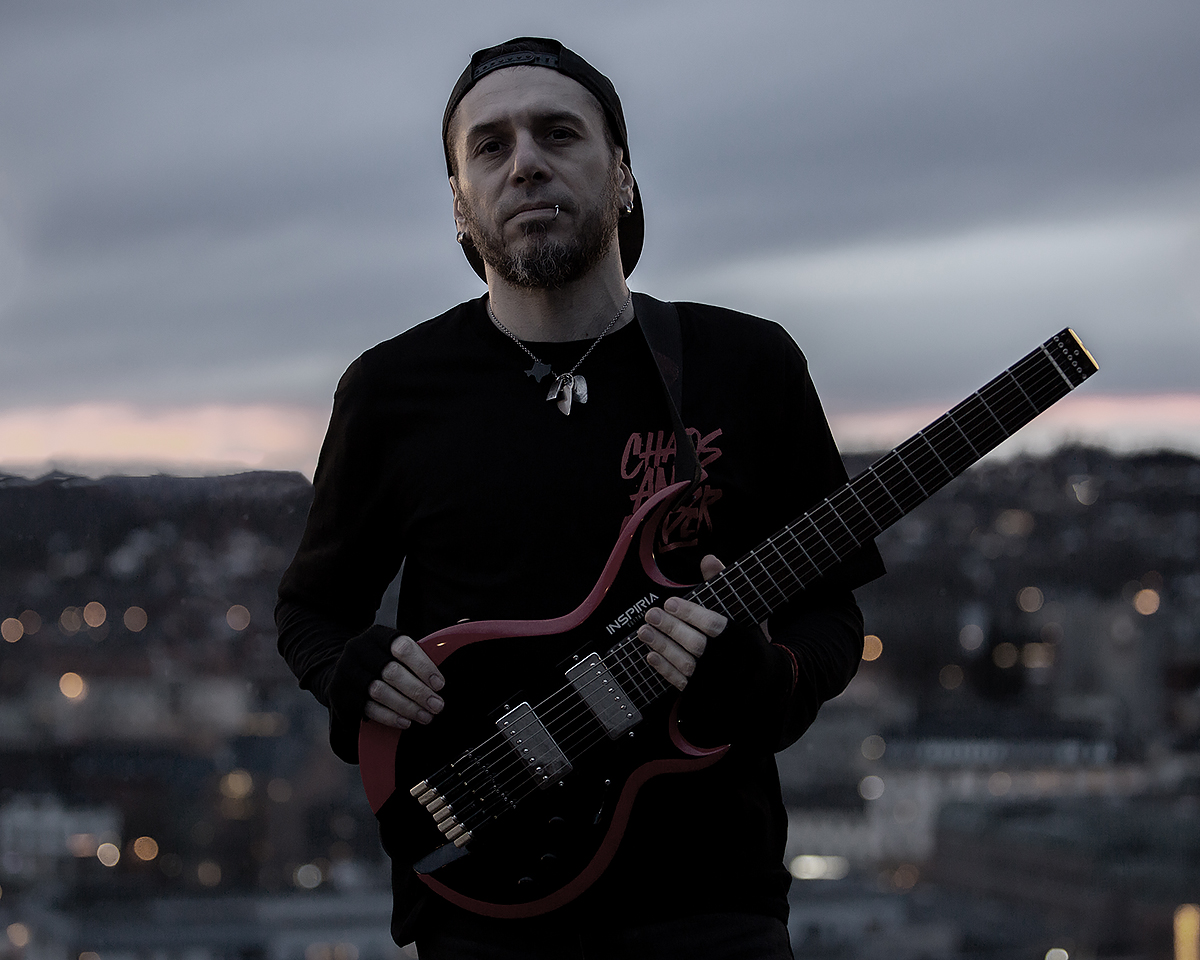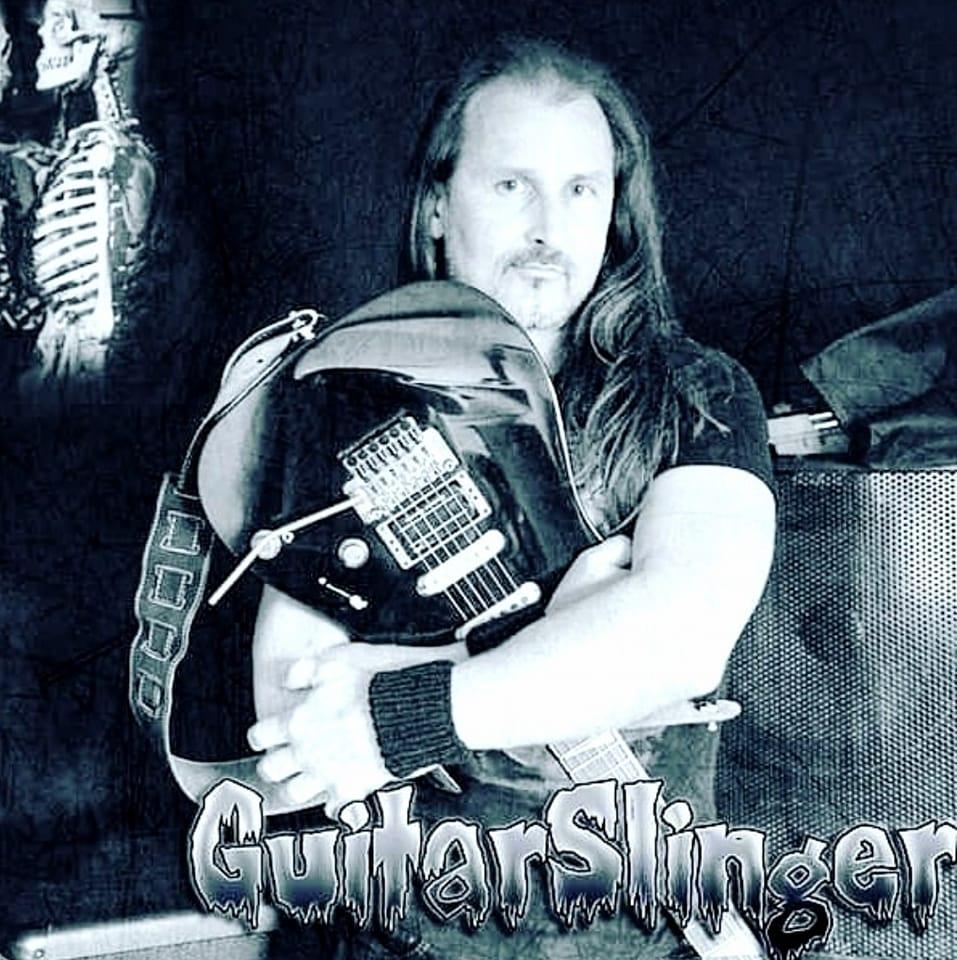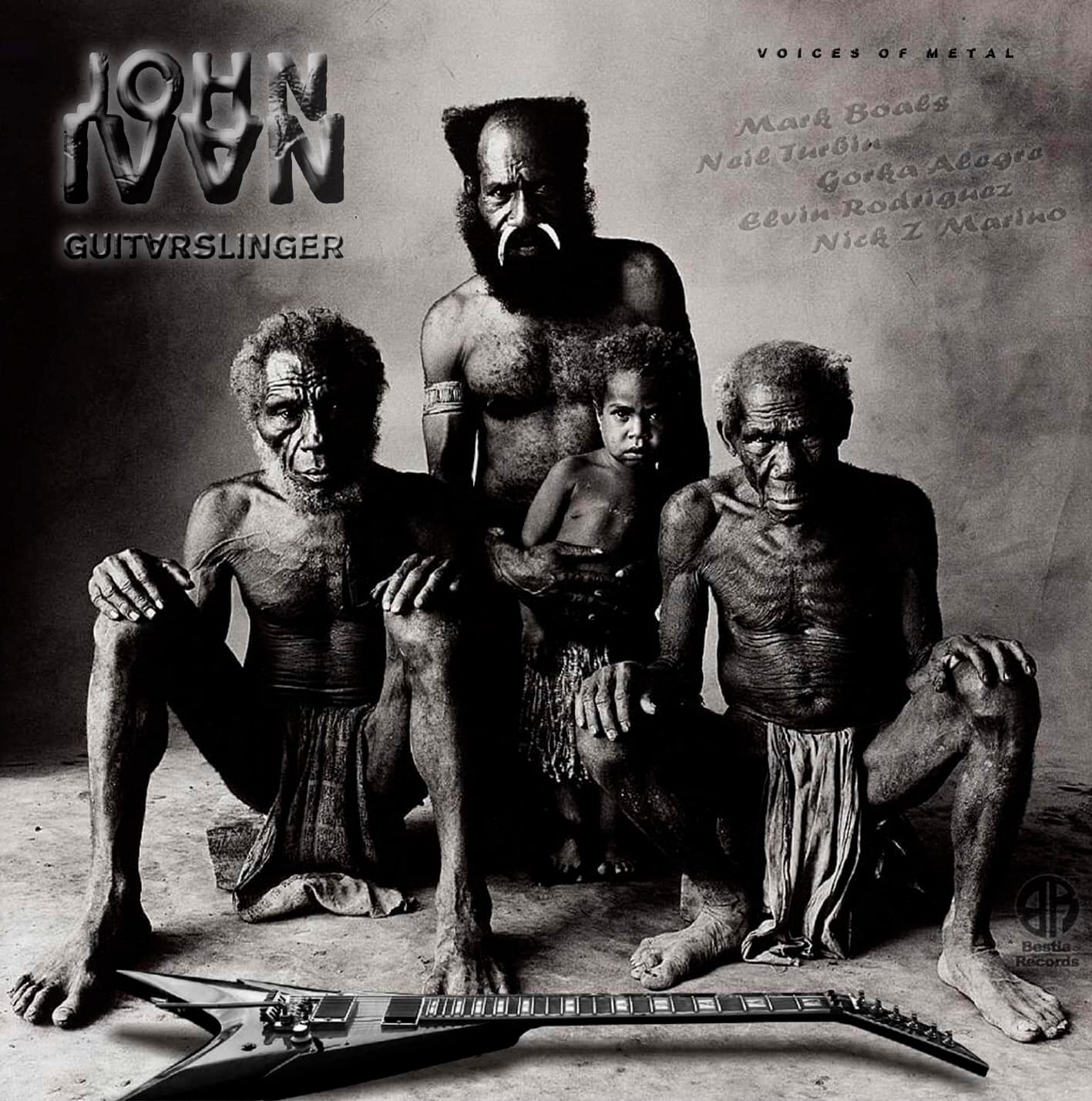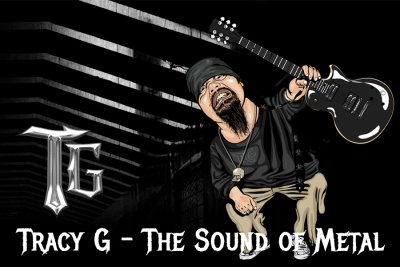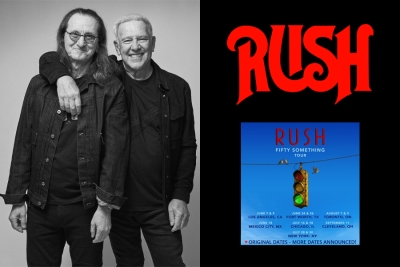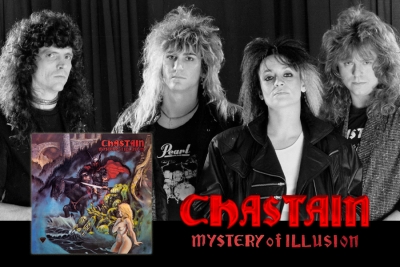In this exclusive double interview, we dive into their artistic journeys, their collaborative philosophies, and the shared passion that drives their relentless pursuit of sound, story, and steel—while exploring the evolving relationships between guitar brands and artists, the trends shaping modern heavy metal, and the shifting dynamics of the music industry as a whole.
Gene
To kick things off, can each of you share a bit about your background and what sparked your passion for music and guitars, and how has it evolved into the work you're doing today?
Demetrio
My name is Demetrio Scopelliti, but my friends call me Dimitry, which is basically a Russian name. I am a European musician. I was born and raised in Italy and moved to Norway 16 years ago. And, yeah, I guess we know each other because of my company Inspiria Guitars and I have been an artist and musician for many, many years and I've been an artist with many companies, starting with Peavey back in the day when I was in Italy and I'm now artist of Randall, Hotone, Mercuriall Audio, and other companies.
As a musician, I have been in a band called Arcadia for about 20 years. We have been all over the place. We have been touring everywhere, releasing five albums, until I decided to start a solo career. And then once I moved to Norway, I started to work more in the music business, opening a couple of recording studios and a music school and then started Inspiria Guitars three years ago in 2022. As a musician, I'm known to be a progressive metal musician. That's what I play, even though I know a lot of different music styles.
When I decided to be a professional musician, I started to study a lot of different styles of music, which was very important for my development, both as a musician, a producer, and then also for Inspiria Guitars because I believe it's important to be versatile as a musician and as a guitar company as well, especially nowadays, because there is more and more mix between genres of music; before it used to be more divided by specific types of music.
Now, instead, let's say progressive music, the kind of music I play, it makes a mix, a melting pot of a lot of different styles, from jazz to death metal. I live in Norway, and, as you say, Norway is the land of heavy metal. If you are born in Italy and you decide to play heavy metal, I guess you should move out because Italy is very well known for traditional music — opera, and pop music. So I was lucky enough to move to the north of Europe many years ago. And the rest is history, I guess.
John Ivan
I'm from Ukraine, actually. But I was born in Siberia and now live in California. About 35 years ago, I founded one of the oldest thrash / progressive metal bands in Ukraine, Bestia. And I've worked with various artists from around the world, including Michael Vescera, Nick Z Marino, Tim Ripper Owens, Mark Boals, Elvin Rodriguez, Neil Turbin, Edu Falaschi, and others. I met Demetrio at the NAMM Show 2025 in January.
Demetrio Scopelliti and John Ivan at The NAMM Show 2025
Gene
As a musician and a founder of a guitar company, Demetrio knows what other artists in the genre are looking for in the instrument, though guitar making is a completely different profession, a different area of skills, and a different area of expertise.
So, Demetrio, tell us a little bit more about your brand Inspiria, about your guitars. How did you come up with the idea, and what makes your guitars different besides just styling and design? What makes your brand special?
Demetrio
I started the company just three years ago, but I worked on making a guitar with another brand on my model signature model. As you said, it's important to have an instrument that helps you to deliver music that you like, that you write. So I started to think about how my instrument should have been because I played a lot of heavy metal, especially back in the day. And honestly, since the beginning of the 2000’s I have played mostly 7-string, let's say.
So, you know, at that time I was looking for my sound, and then I was lucky enough to start working with other companies on my instruments in 2019. We were developing something together — prototypes, and the one that would be one of my signatures. And we actually managed to make the first prototype of my signature model, which basically was the first Inspiria guitar.
So basically, when we went back over the winter from the Covid period, I lost a lot of contacts in this business. So once back I felt like it was the right time for me to start my own company, and I already had a list of names for the company. Believe it or not, I have a file in my phone with names for some songs, album titles, and all this, you know, and Inspiria was the name of my song that I wrote probably in 2017. And when I was scrolling down the titles of songs, the name Inspiria came first, which obviously means “inspiration,” and that's my motto in a way. And over the Covid period, I had lots of extra time to think about new guitar models with 7 and 8 strings, for the kind of music that I played for around 25 years (at that time), probably, the progressive material with lower tuning. And I tried to use my experience as a musician and a guitar designer to create different models for the modern day. They might be applied to different kinds of music, and, believe it or not, I thought of creating a 6-string guitar that is very, very versatile. Even some jazz players really like that.
In 2022, I started the company, and in the beginning, I had this creative need for making guitars for the music that I play. And I was thinking maybe someone might find those instruments useful for their music as well. But I didn't really know that in like, two - three years, we would have been at that point where we are now. So, in the beginning, I just thought I would like to do this as a side project, and now it's taking over, which is good.
DLP8 Dimitry Signature Model (Initial design)
Gene
Isn't that kind of interesting how things develop?
Demetrio
Yeah, that’s right, it is. You know, you start with an idea and then suddenly you land somewhere else, which is something that I would not have done just as a musician.
Gene
John, what are you looking for in the instrument for yourself? What can you say because you have your own distinctive style and your own kind of experience with different guitars and you've been playing custom-built instruments, and I know you have your own kind of idea and the way you approach the instrument?
John
Yeah, actually, me too, I also worked with two talented guitar makers in Ukraine, Alexander Tretyakov and Valentin Trubnikov, who passed away unfortunately. And I had known these guys since 1987, and we built my first guitar around 1990 or 1991. And since then, we’ve worked together on several of my guitars. And so I have a kind of collection, and working with these guys, I also learned a lot about guitar building — different kinds of wood and how they’re glued together and stuff like that… different pickups, different necks… When I first met Demetrio, his guitars looked different from the others. He seemed like a really nice guy. The most important thing is that when you meet the right guy, and you try different stuff from him, you may find it interesting.
And as for me, I have a clear idea of the guitar I’m playing right now. And actually, the last one was made 15 years ago, and by then, I already knew what I wanted. It's tied to the body design because I really like a lot of sustain on a guitar. When I have a guitar with a maple neck glued with several layers of a different type of wood, like padauk, rosewood, or other redwoods, it creates a unique and special sound. It's pretty aggressive and it's kind of violin-ish, if you can say that. So it has to have its own voice — that's it. You know, it should be nice.
Gene
And you also have certain ideas about the construction, like scalloped necks and Floyd Roses, that sort of thing. Because not a lot of guitarists play scalloped necks, but it's kind of a guitar that Yngwie Malmsteen plays.
John
Since the early 1990s, my second custom guitar had jumbo frets — the biggest ones, and Demetrio knows that. And since then, when I go back to other guitars with smaller frets, it feels different. And probably around 1996–97, I tried to carve scalloped frets by hand on one of my guitars. And I did a few frets — four or five, in the higher register of the neck.
And I put the strings back, tried playing it, and oh man, I liked it! And when I did from the 12th to the 24th fret, put the strings back on, played it, and I was like, 'Oh, I'm gonna do this to all the frets, the whole neck.' It's a totally different feeling. Mostly, not all guitars, but most of my guitars have scalloped frets.
With jumbo frets and scalloped frets, you don't need to make the frets too deeply scalloped. When you look at guitars like the ones from Ritchie Blackmore or Yngwie Malmsteen, they have necks with scalloped frets that are pretty deep. When it comes to my guitars, the fret depressions aren't that deep. With jumbo frets, the scalloped part is just slightly carved, so you can't really touch the wood. And that's the idea. So you get a scalloped neck and maintain your sustain. This way, your neck isn't weak anymore; it's still very stable – Demetrio, you know what I mean, right?
Demetrio
Yeah, yeah.
John
And yeah, that’s an idea. It’s scalloped but not too crazy, just a little bit different. And yeah, I also use the Floyd Rose tremolo. I actually use Schaller, which is a slightly different kind of Floyd Rose, and they are the best Floyd Rose systems ever made. In my opinion, they are different, and on my guitars, they all have Schaller hardware. It’s German quality, and that’s it.
John Ivan GuitarSlinger
Gene
Demetrio, how do you see relations between the brand and the artist, especially in the light of the fact that you're also endorsed or working with brands like Randall Amplifiers and Hotone, which is also one of the growing brands as well. In the last ten years, Hotone has grown substantially, and they have a pretty impressive roster of artists, such as Larry Mitchell and others. So, what can you share with us about your experience working with major brands and what you're looking for in artists as a guitar manufacturer?
Demetrio
Well, yeah, I worked with this company for a while, and before that I worked with Peavey and I was lucky enough to be pretty friendly with those guys who were part of the guitar department and I was not dealing directly with England or the U.S, so I had really close relationships with them. And I think, you know, it was very important to see how the companies deal with artists. I had good experiences and I also had bad experiences. So at the end of the day, I really understood that one of the secrets to having different guitar companies is generally to respect the artists, which is very important to have feedback on the product and to develop a brand, of course.
And, so the first mission as a guitar brand is to serve the guitar player and be very close in developing the brand and the artist’s image at the same time, which is the same as a brand. There is a two-way relationship, and I have a lot of respect for artists, of course, because I know how it feels to be on the other side. That is very important to support and be very close to and like the artists. Like some of the companies I work for, I work on other things together, and they have the same philosophy, the same vision.
And, you know, it is very important for developing the products in general, and it is pretty often when we are working on a prototype, the first thing we do is to always involve the artist in this process, because we all have different opinions. And we all play in different ways, and to be able to develop product lines in line with those artists, and so it's important to have feedback, you know. Some people say that the secret is to have a brand behind the artist, and I believe there is some truth there. Even though I work together with serious professional guitar-making guys and because they can make decisions, I know what I want and I just say what I think and suggest my drawings, and I can oversee the production and try them out. And that is basically a full-time job.
Inspiria HL6 - 2024
Gene
What do you guys think about the music industry, where it's going right now, and is, specifically, with the heavy metal scene, because in my observation, it has become really diversified in terms of subgenres. It's sometimes difficult to navigate between those subgenres — nu-metal, progressive, deathcore, thrash, and all those styles, how they are infused with each other, and how they intersect, and what's going on in that?
And also in terms of the trends where metal music and heavy music are right now. It seems like there are still huge venues being filled by bands like Metallica, Megadeth, or big festivals going on all over Europe and the United States as well.
But in the mainstream, in the mainstream media, it's like it's becoming kind of a subcultural thing. So, where do you guys see it going? What's your feeling on that?
John
Yeah, well, as for me, I really think metal is making a comeback right now. And we can see different bands here in L.A. – there are a lot of them around right now. Everybody’s back, and just last year I saw a lot of guys, a lot of bands, a lot of great guitarists. They’re all here.
Maybe it's a different way of doing things. It’s just different, you know — when the internet first showed up, it pretty much killed the whole show business. Record companies just don’t work the way they used to. Today, musicians make most of their money from touring — they hit the road, and that’s how they make a living.
So I think it's starting to come back now. There was a period when things really went downhill after the rise of the internet, but now it's coming back — just in a different form, looking for new ways to survive.
John Ivan GuitarSlinger Live
And I don’t know, but I think the business is still alive — a lot of fans are coming to shows, and artists are still making albums, which is great. Maybe they’re not making the kind of crazy money they used to — you know, millions — but that’s okay. If you’re in music just for the money, maybe it’s not the right place for you. If you want to get rich, go do something else. Music is art, and if you’re truly dedicated, it will be good for you and for everyone else. That’s just how I see it.
Yeah, metal today has so many different directions — it's really about blending all kinds of styles together. As for me, maybe just as a music fan, I probably haven’t heard every band out there, but I know what feels right to me. If something sounds good, it’s good. And if not — it’s not. When musicians change their style just because it’s trendy or popular, that’s not my way. I prefer music that you can really feel. Look at guys like Joe Satriani or Steve Vai — they just do what they do, and it is good! And everybody can feel that. So that's what I think.
Gene
Demetrio, what do you think about this?
Demetrio
I started playing guitar in 1993. And I have seen a huge development in business, changing constantly and very fast. At the same time, I kind of lost track of all these developments, and I listen to some music, some bands that are new, and I don't think there are so many new bands that have something fresh to offer, but there are some, you know.
I think that heavy metal is a kind of music that is still linked to old school music, not just because I listen to a lot of old bands, but because I do some. I do like teaching, and the new generation still listens to some music that I listened to when I was a kid. And we're talking about a 30-year difference, you know.
There should be a reason. And they say to themselves, we don't really listen to it because we don't like it, just because we are students, young people in general. Even though I think there is something there, I think that even as I mentioned before it was a kind of a mix of different genres and that might be because of development of how we used information back in the day, to get the tabs and the scores of the songs to read and understand the technique, because we did not have the same tools that kids have these days in order to learn how play the songs.
Demetrio Scopelliti:
The first mission as a guitar brand is to serve the guitar player and be very close in developing the brand and the artist’s image at the same time, which is the same as a brand.
There is a two-way relationship, and I have a lot of respect for artists, of course, because I know how it feels to be on the other side.
You know, if you measure music in terms of the technique, which is not the way to do it, the level of technique is not the same as something 30 years ago. And if you go on YouTube and see a kid in Japan shredding who is 7 years old, and as I say, if you are measuring music by its technique and not as an art, this is why there are not so many songs that you like. Though there are some that I really like, it is really hard to find somebody who really comes up with something unique personally.
And especially because of recording techniques nowadays that tend to make music that sounds more of the same, but at the same time, I see more different kinds of music, not heavy metal, but mostly in pop music and mainstream music songs that are short. Listen for just one minute or one minute and 20 seconds maximum. In heavy metal, one minute would be just an intro to a song. You know what I mean?
Yeah, so I actually did the International competition here in the US, where they said that the songs must be no more than one minute. And I said, well, one minute and I'm still playing the intro to the song so I had to arrange the song in a different way, but if you're going to understand my song, it should be at least three to four minutes, or even seven or eight and the length of the song should be like it is a piece of work, like a collage of riffs, a song written with a meaning.
John
I’ve got a story about the same, just a quick one. It was about 30 years ago at the Musicians Institute here in Hollywood. We had a teacher, and every Wednesday we’d be up on stage. It was part of a class where all the guitarists would take turns playing live on stage.
So our teacher would give us a chord progression, and we had one of the best drummers at the Institute, along with some of the top bass players. It felt like a real band on stage, with about 20 guitarists lined up, all eager to take part in the lesson.
When I first got there, there were two guys — one probably from Brazil and one from India, I think — plus a few American guys. These guys were, like, top shredders, you know, and everyone was like, 'Wow!'
And when I first saw them, I was like, 'What is this?' They had just three or four chord progressions, and the drummer and bass player were playing the same thing over and over, just beat by beat. Every guitarist came on stage, plugged into the same Marshall JCM 800, and played licks and things that made no sense to me. I was like, what are you doing? It was just like playing scales — like trrrrrrrrrrr. Well, I get it — sometimes it’s cool to sit in your room and shred as fast as you can. I mean, that’s basically what I’d been doing for years. But when you're on stage, you've got to bring more — it has to be music, not just practice or something.
Like, sometimes I listen to these new bands and think — what is that? A solo? There’s no melody, nothing — just trrrrrrrrrrr, right? What is it? It makes no sense. And when I got up on stage, the first thing I did was stop the bass player and the drummer, and I said, ‘Hey, can you just change it up a little here and there? And these guys were really, really good. So I showed them a riff from my band (BESTIA), and we started with their chords and mixed them with mine. I played some of my own stuff over it — using different modes — and it sounded totally different from what we’d been hearing before, you know, all that trrrrrrrrrrr shredding. And when we mixed it, it went in a different direction: I played a melody, and my teacher was like, 'Oh, that’s interesting!'
Demetrio
It was very interesting! Well yeah, that's what I meant and now of course music is changing very fast, you know, but honestly I want to say where we are going and I can see in heavy metal it is, in a way, a little bit more conservative kind of music, compared to some other fields. What I'm trying to basically understand nowadays, and that's maybe a question for you guys. I still think that making the album is relevant in heavy metal music. I am not sure about pop music, maybe, but in heavy metal music, I still see that it is relevant, and I’d like to ask you guys what you think?
Maybe things are going more toward making mini albums in a shorter period of time, maybe save some time, some energy, and some money for the production to actually have a release every six or eight months, something like that. But what do you think?
Demetrio Scopelliti, Inspiria Guitars at the NAMM Show 2025
Gene
That's a big, big topic. The way I see it, the streaming industry, the streaming services, they kind of devalue the albums as a concept. And what they do they push people to release singles as standalone releases and then push the singles into playlists to be heard. Yeah, that's maybe not the only way, but that's a dominating way of pushing the music and promoting the music. It used to be Dimitri and John, you guys know it, that singles were released as a promotion or a test for an upcoming album. And, you don't release 10 to 15 singles from the album. You release one, two, maybe three at the most, creating an anticipation for the album to be published. And fans would just wait until the album is there. So, releasing the album is a bigger event.
And nowadays, artists are still trying to make it an event with album releases. But for fans, it doesn't really matter because they are just waiting for a new single, another single, another single to add to playlists, and there is no connection between singles until they are added into the actual program. Like it used to be, like Pink Floyd or Metallica, where the album is actually a program, some kind of a suite of compositions linked together through a common theme or even a story or something like that.
John Ivan:
If you’re in music just for the money, maybe it’s not the right place for you. If you want to get rich, go do something else.
Music is art, and if you’re truly dedicated, it will be good for you and for everyone else.
It doesn't matter which genre you are in; artists are still forced to build a program for their performances. If you just write 20 singles that are not connected, your live show won't be as solid as it would be if you perform the entire album. Because an album is more like a big milestone. And that gives an artist an opportunity to tell a bigger story. And to distinguish one, maybe, one point of their career from another. But if they just release random singles, I don't see it... It's kind of like diminishing the whole value. It's just, what are you doing at the show, of course, if all your songs are the same, whether it's just a dance song or something, or even if it's metal songs, but they're all the same. Every song is like a continuation of another song, but it will not make you a big artist anyway.
It does take time to create a program that's unique on its own, but also as a set of unique numbers, and again, if you take classic Metallica albums or Pink Floyd albums or Rolling Stones or even in pop music, you can say, like if you look at something like early Motown or Michael Jackson, his album is a program, like Thriller - is the whole movie. It's like a whole big kind of act, right? So, that's a challenge in my opinion, and artists trying to force the albums, but the streaming services, they're trying to put albums aside. So on Spotify, it is sometimes difficult to isolate albums from the playlists.
Demetrio
But in a way, I can see that people listen more if I have an album, so they stream more of my songs, I mean proportionately, of course. So I usually listen in the same way. When the band releases a single song, I am waiting in anticipation for their album, so I don’t want to listen to single songs; I want to wait and listen to the whole album to have a better experience. But you know, I probably look at something different in music, and for me it's important to listen to the whole album because it's in a way a story. The story is dynamic. It is a track list that is made on purpose.
And, there is a sound and the production and everything is, you know, built up a story in one way or another. It may be that in the progressive metal world, people still listen to the whole album, or maybe they listen to singles, and it might depend on a fan, the area, or the age.
Demetrio "Dimitry" Scopelliti, born in Vercelli, Italy, began his journey as a guitarist at 13 and went on to found the progressive metalcore band Arcadia, touring globally for two decades. After graduating from the European Music College in Milan, he released a series of solo albums, including Evolution (2008), Codex Magika (2012), The Art of Complications (2016), The Silent Watcher (2018), and V (2020), the latter of which he recorded entirely by himself during the pandemic lockdown. In addition to his solo work, Dimitry has collaborated with bands like Dammercide and contributed to recordings with artists like Ingrid Digre, Greg and Matt Bissonette, and producer Jeff Weber.
Now based in Norway, Dimitry is a music educator, producer, and the founder of Inspiria Guitars—a brand he launched after showcasing his work at multiple NAMM Shows, Guitar Summits, and Music China expos. His instruments and performances have earned him endorsements from companies such as Hotone Audio, Lundgren Pickups, and Two Notes Audio. In 2022, he represented Norway at the World Championships of Performing Arts in Hollywood, winning three silver medals. His recent projects include performing with violinist Laurent Bernadac and releasing Infinity, a duo album with saxophonist Aina Davidsen, while preparing his sixth solo album for release in summer 2025.
Follow Demetrio Scopelliti

Inspiria Guitars was founded by Guitar Player & Composer/Producer Demetrio Scopelliti in 2021 with the purpose is to create high quality instruments for modern rock genre (prog, metal, djent and modern alternative music in general).
The guitars have been designed together with engineer/designer extraordinary Alessandro Tardivo and tested through the years in various different situations (studio, live, touring) in order to make sure they make musicians’ life easier in every kind of session.
The extended range DLP7 & DLP8 will give you the opportunity to change the tuning of your guitar with just one click thanks to the hipshot extender tuning mechanics..
Follow Inspiria Guitars
John Ivan is an internationally acclaimed progressive and thrash metal guitarist and songwriter, renowned for his virtuosic high-energy shredding style, lightning-fast heavy riffs, intricate solos, and dynamically electrifying performances. He is a creative and innovative composer, a founder of the thrash metal band BESTIA, a member of the Michael Vescera Project, and co-founder of The Voices of Metal Project.
With his successful career, John Ivan has established himself as a formidable force in the world of rock and metal music. He has collaborated with legendary rock vocalists Tim Ripper Owens, Michael Vescera, Nick Z Marino, Mark Boals, Elvin Rodriguez, Neil Turbin, and Edu Falaschi. John worked with the bassist Gorka Alegre, among other high-profile artists.
John’s latest studio album, entitled "The GuitarSlinger," showcases his immense talent and relentless dedication to his craft, solidifying his status as one of the world’s premier and most distinguished guitarists. With each note, John Ivan continues to push the boundaries of guitar-driven music, inspire and influence aspiring musicians, and leave an indelible mark on the world of rock and metal music.
John Ivan GuitarSlinger on SULÉY ERA | Music Life
John Ivan - GuitarSlinger
All rights reserved to Bestia Records, 2024
All rights reserved to Bestia Records, 2024
Articles by John Ivan:


